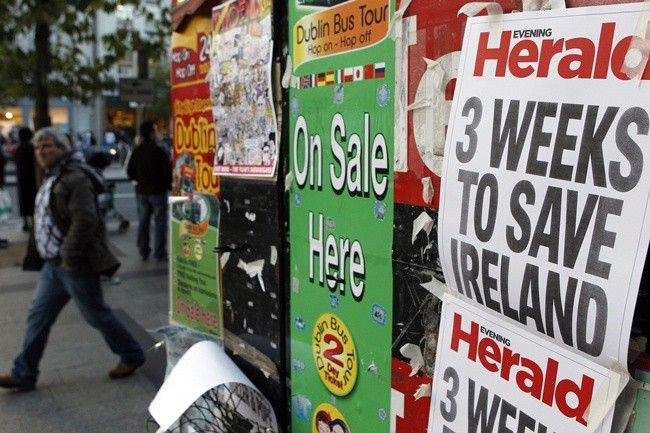EU/IMF bailout for Ireland doesn't seem to be working

The massive European Union (EU) and International Monetary Fund (IMF) bailout for Ireland doesn't seem to be working.
European and Irish officials formally announced last night, in time for the opening of Asian markets, that Ireland has requested a bailout. The size of it, according to Reuters, will likely range from 80 to 90 billion euros.
The markets initially cheered the news as the euro currency, European stocks, Irish stocks, and Irish bonds all rallied. Optimism soon faded, however, as the Irish stock market closed with losses and shares of major Irish banks plunged. The 10-year Irish bond was still up for the day, but not by much. The euro reversed early gains against the dollar and is now below last Friday's closing level.
EU/IMF bailouts don't seem to be working.
When they bailed out Greece a few months ago, the market reacted well initially but gave back the gains in a short period of time. When they bailed out Ireland, the news was welcomed with even a smaller knee-jerk rally and a quicker reversal.
Since the initial bailout, Greek bonds have steadily declined in recent months, giving up a huge chunk of their bailout boost. The fate of Irish bonds, which didn't even get much of a bailout rally in the first place, probably will not be better than that of their Greek counterparts.
One flaw with the EU/IMF bailouts is that they don't really solve the underlying problem, but only buy some temporary relief. In addition, EU bailouts weaken and contaminate the balance sheet of the EU and its largest constituent Germany, which does not bode well for the euro currency.
Another concern is that austerity measures, attached as a condition of receiving bailout money, are difficult to implement politically and puts both Ireland and Greece's economic recoveries at risk.
As soon as the bailout was announced, Ireland's Green Party, the junior partner in the country's coalition government, already broke ranks with the ruling Fianna Fáil party and has called for a general election early in 2011.
In other words, Ireland's current coalition government will be no more in a few months.
Meanwhile, it will likely support the EU/IMF bailout package and work to iron out the details of the deal.
However, the concern is that the newly-elected government will not implement or even accept the austerity package negotiated by the outgoing coalition government.
Moody's dealt another blow to Ireland.
The ratings agency said it would probably downgrade Ireland's current 'Aa2' rating by several notches, although the downgraded rating will still be investment grade. Greece's debt rating is currently rated junk status.
Moody's said Ireland's credit outlook worsened because the bailout shifts the burden of their banks' liabilities onto the government's balance sheet, even if the EU/IMF will help pay for some of that burden.
Email Hao Li at hao.li@ibtimes.com
© Copyright IBTimes 2025. All rights reserved.





















